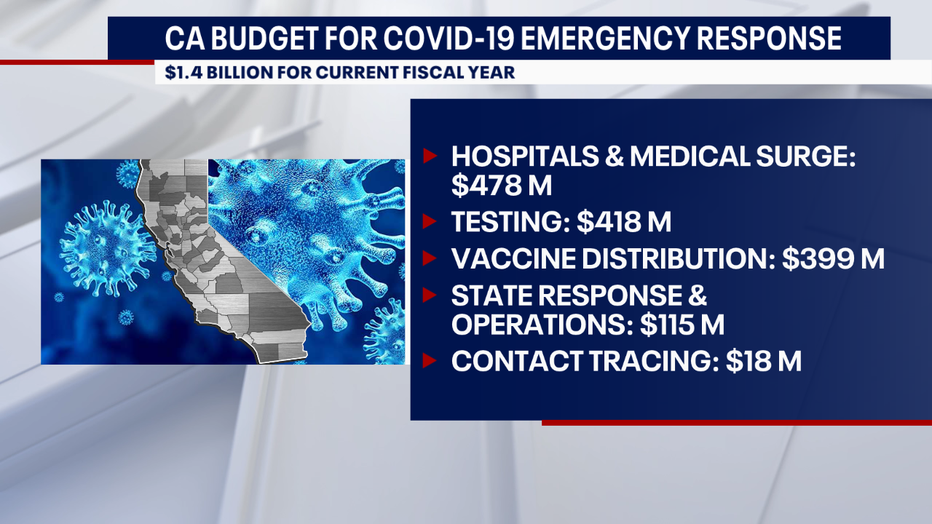Gov. Newsom proposes $2.7 billion to battle spread of COVID
SACRAMENTO, Calif. - As COVID-19 cases continue to surge both across the Bay Area and the state, Governor Gavin Newsom announced the state is proposing to spend $2.7 billion on expanded efforts to stop the spread of COVID-19.
Officials in the Governor's Office shared a preview on Saturday of the budget Newsom will unveil on Monday, noting that he'll be asking the state legislature to approve some of the funding very quickly. His goal is to add an additional $1.4 billion to this fiscal year's budget.
With more than 10,000 Californians hospitalized on Saturday, and thousands more isolating at home with the Omicron variant, Governor Newsom is proposing that the state legislature immediately approve funds that will aid hospitals strained by the surge in Covid-19 cases, expand testing programs, and provide greater vaccine distribution in the state's prison.

Millions of dollars will be allocated to new efforts to combat misinformation, particularly in communities of color, Newsom administration officials said Saturday.
"We need to combat that misinformation, and I know it's too bad that we're in this position that we have to, but I love that he's putting money into that," said Dr. Monica Gandhi, professor of medicine and an infectious disease expert at UCSF.
Newsom will also ask legislators on Monday to implement a new supplemental paid sick leave policy for this year, given the impact of the omicron variant on workplace staffing.
He's also proposing another $1.3 billion for the next fiscal year's Covid-19 response. The bulk of that--more than $7.4 million--will continue to support Covid-10 testing programs.
SEE ALSO: Gov. Newsom activates National Guard to assist with COVID testing sites
Dr. Gandhi expects, in the next year, the United States Centers for Disease Control to recommend that only symptomatic individuals get tested for Covid-19.
"Most likely, with all of these respiratory pathogens that we're going to have every winter, we're going to just start testing people who are symptomatic, not asymptomatic, Gandhi said. "I think before, we were hoping we could eliminate it [Covid-19] with lots of testing and contact tracing, but [that's not the case] with omicron."
Public health experts are hopeful the omicron surge could be nearing its peak in California. A Newsom administration official said there was hope by the end of January and early February, the number of cases will decrease.
SEE ALSO: Cloth masks aren't enough to fight off omicron variant, health experts say
Dr. Gandhi says it's reasonable to extrapolate the data from South Africa and the United Kingdom, where Omicron cases have decreased, given California's high rate of vaccination.
"That extrapolation means around mid-January [cases will] peak, [then will be] going down for a while," Gandhi said, "and then by the beginning of February, at least in this state, things looking good."

